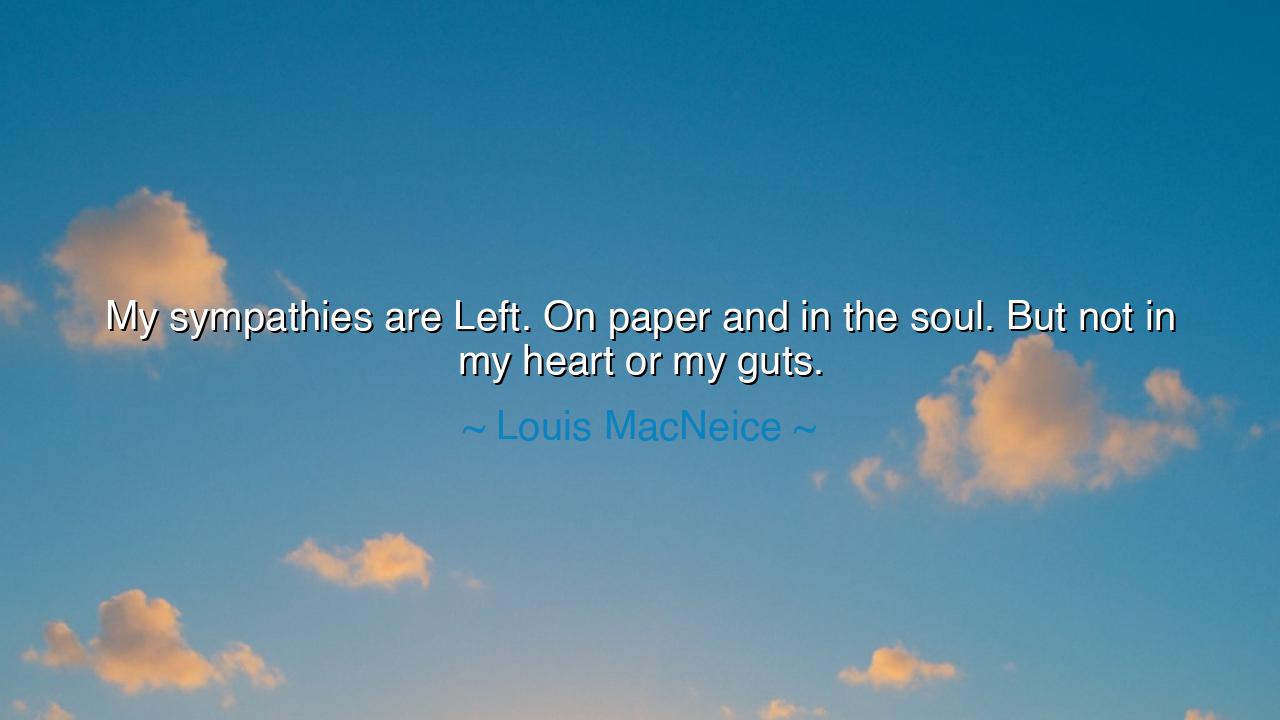
My sympathies are Left. On paper and in the soul. But not in my






In the heart of every person, there lies a conflict between the mind and the soul, between the ideals we hold and the emotions that guide our actions. Louis MacNeice, in his words, "My sympathies are Left. On paper and in the soul. But not in my heart or my guts," paints a picture of the struggle that so many face in the course of their lives. Here, he speaks not of ideological consistency, but of the tension between intellectual belief and emotional experience—how we may hold one truth in our minds yet feel something entirely different in the depths of our being. This is a universal theme, one that echoes through the ages, for throughout history, people have often been torn between what they believe is right and what they feel is right.
In the ancient world, the philosophers wrestled with the relationship between logic and emotion. Plato, in his dialogues, often sought to elevate the mind above the impulses of the body and the heart, believing that true wisdom lay in the rational understanding of the world. Yet, even in his teachings, there are moments where he acknowledges the power of the heart, the soul, and the passions. The Stoics, too, struggled with this dichotomy, trying to train the mind to govern over the emotions, yet understanding that humanity cannot escape the deep pull of feeling. MacNeice’s quote brings this ancient conflict into modern terms, revealing how ideals can often clash with the reality of our lived experiences.
Consider the life of Socrates, who, though a paragon of rational thought, was also a man driven by curiosity and a deep yearning for knowledge that went beyond mere logic. Socrates’ belief in the power of reason did not make him immune to the emotions that accompanied his trials and ultimate death. His dedication to the truth was clear, but there was a profound personal cost to that truth, a human toll that he bore even as he stood unwavering in his philosophical beliefs. This paradox—between the head and the heart—is not a new one, and it resonates deeply with MacNeice's words.
MacNeice, an artist of poetry, recognized that there is a difference between the world of ideals—the space where beliefs are made—and the raw reality of human existence. The Left—a political ideology that, for many, embodies social justice and the rights of the oppressed—may be a banner under which one marches in the name of hope and progress. Yet, as MacNeice points out, it is not always an ideology that lives fully in the heart or guts, for the reality of human life, with all its complexities, often resists the ideals we cling to. Compassion may be the guiding principle of the Left, but empathy can feel far more complicated when one is confronted with the harsh realities of human suffering, injustice, and inequality.
The ancient heroes too experienced this inner conflict, as they were often forced to balance their own humanity with the greater good. Consider Antigone, the daughter of Oedipus, whose devotion to the moral duty of burying her brother led her to defy the king’s orders. In her heart, she knew the right thing to do, yet her actions led to her tragic death. Antigone was driven by the conflict between what was right in the eyes of society and what was right in the eyes of her soul. The ancient tragic heroes often embodied this tension, standing at the crossroads of reason and passion, torn between following their principles or their emotions.
MacNeice’s reflection teaches us a crucial lesson about the complexity of human nature. The mind can strive for idealism—be it in politics, philosophy, or art—but the heart and the gut carry the weight of experience, of the real world, where every decision is fraught with consequences that cannot be neatly resolved through reason alone. It is a reminder that perfection is elusive and that the human condition is one of constant tension between ideals and lived experience. The challenge, then, is not to abandon our ideals but to acknowledge the complexities of being human and balance them with wisdom.
In our own lives, we must strive for the same balance that MacNeice and the ancient philosophers spoke of—a balance between intellect and emotion, between ideals and the reality of our experiences. We must honor our beliefs while being mindful of the emotions that guide us. The lesson is to recognize that it is okay to be imperfect, to feel conflicted, and to live in the tension between what we wish to be and what we truly are. It is in this struggle that we find the essence of our humanity, and it is in embracing this tension that we can live with both honor and compassion.
Thus, let us walk with awareness of this conflict within us, recognizing that the journey toward understanding and growth is rarely straight or simple. We must strive to be both thoughtful and empathetic, seeking the balance that makes us whole, and finding wisdom not only in what we believe, but in how we feel and experience the world around us.






AAdministratorAdministrator
Welcome, honored guests. Please leave a comment, we will respond soon